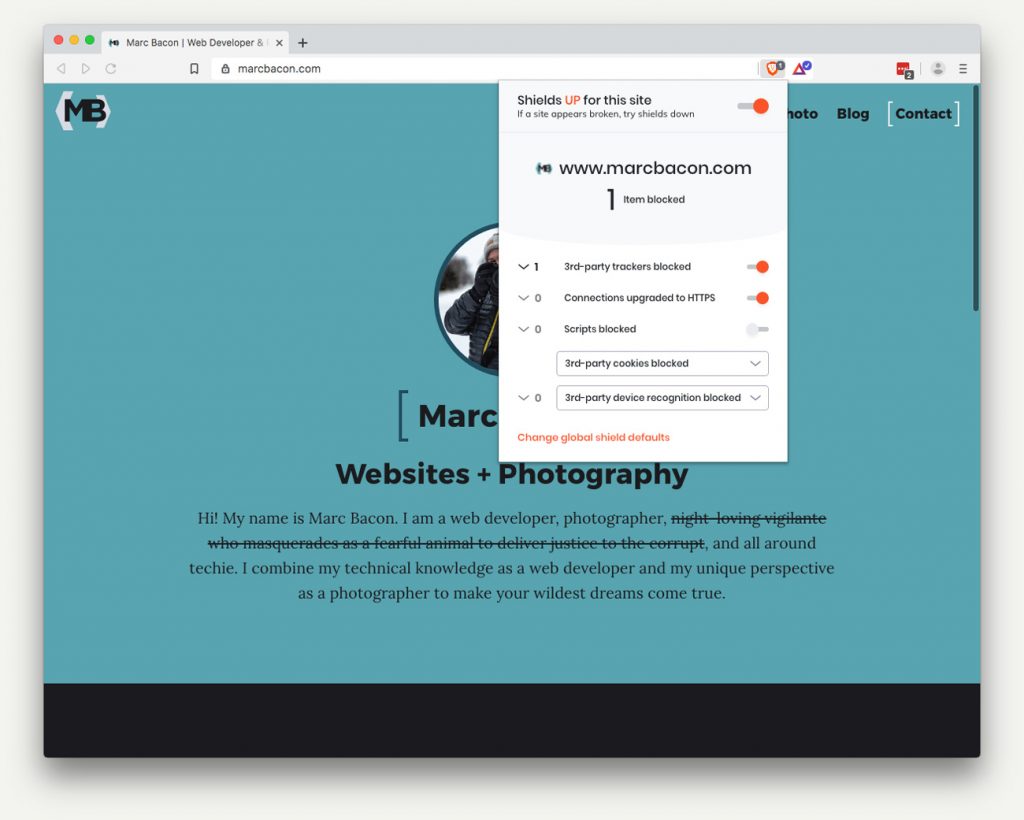A Brave New Web: Will the Brave Browser Change Digital Marketing and Advertising?
The Brave Browser promises fewer advertisements and tracking script blocking for its users. Is this a problem for advertisers, publishers, and digital marketers? These security features are great for users and could change the landscape of the internet as we know it.
What is Brave?
Brave is tailored to the everyday privacy-conscious web user. Unlike previous privacy centered browsers, Brave has a great user experience that makes it easy to use and easy to love.
The Brave Browser is based on Chromium. This means that it has the same bones as Google Chrome. This is a huge benefit to the browser. It looks and feels almost just like Chrome which makes it easy for new users. As an added bonus, most Google Chrome extensions even work on Brave as well.
The difference that it offers is the powerful suite of privacy features baked in, including 3rd party tracking script blocking and adblocking.
How could Brave change digital marketing?
We are already in a privacy revolution of sorts on the web. A number of current events have brought attention to our privacy. Online advertising and digital marketing are already changing because of this.
Brave is a great solution to some of those concerns. If adoption of Brave ramps up a lot, or if other browsers start to utilize some of the same features, it could potentially reshape ads and marketing on the web.
Brave Blocks Online Advertisements
Blocking ads and tracking scripts is great from a user standpoint. Ads and tracking scripts can really bloat a website so blocking them makes sites load much quicker. Understandably, blocking these could be concerning for advertisers, publishers, and even website administrators.
Adblocking is not necessarily a new issue for online advertisers. Browser extensions have been available for a long time. However, Brave is different. Brave has a chance to be the first mainstream browser to block ads and tracking scripts by default. This could lead to higher adoption and more mainstream use than traditional ad-blocking plugins have reached in the past.
Enough users blocking ads could start to lead to changes in how we use the web. Publishers could start to lose revenue. Advertisers could start to abandon some advertising sources that used to reach a lot of people.
In theory, this could completely change how the web is used by advertisers and marketers. Advertisers and marketers may be forced to turn to more creative and alternative means for advertising.
Brave Has a Solution for Publishers
Brave includes a feature called Brave Rewards. Users of the browser can opt in to be sent ads as push notifications. The user will receive a small amount of the cryptocurrency BAT for viewing these ads.

At the time of writing this article, the only way that a user can spend their BAT is to tip publishers who are verified through the Brave Rewards program. Brave has come up with a brilliant solution to circumvent obtrusive ads on websites but to still reward publishers with great content.
I am skeptical that this could replace traditional advertising for large publishers, but this is a great feature for smaller blogs.
Brave Blocks Tracking Scripts

If blocking tracking scripts becomes a mainstream feature, it could disrupt digital marketing. A smaller sample of metrics gathered by tracking scripts would mean less reliable data. This data is used by digital marketers and web developers as ways to debug potential users issues, improve the experience and speed of a website, and to even make brand choices. Tools such as heatmaps and ab-testing could quickly become hard to use and unreliable.
This may mean that changes are made to websites based on an issue noticed by a small number of users. There is a potential that issues could be made worse or missed due to the lack of this data. Unfortunately, this is a con for both users and online marketers.
Websites may need to adapt to become less obstructive to users. Digital marketers and webmasters may need to start relying on less data about their users to make decisions or to come up with creative ways to reward users in exchange for their data.
Change is Already on the Horizon
People are starting to value their data and privacy on the web. I predict that this will be a theme that will change things in the future. I think that this bold step by Brave is a testament to these looming changes.
I feel that people should be in control of their data. Their browser should be the vehicle that they use to do that. If they do not want to see ads and to be tracked then it makes sense to give them the ability to do so.
Recent legal initiatives such as GDPR put the onus to allow users privacy on the publishers, but I have always argued that users should have the ability to control this at the browser level. Let’s all start using Brave so that we can finally get rid of those dreadful cookie notice banners.
Conclusion: You Should Use Brave Browser
Online advertisers, publishers, and digital marketers may experience some bumps in the road as features that Brave introduces become mainstream. They won’t like it but will find ways to adapt. This will eventually make the experience of using the internet much better for everyone.
I went ahead and signed up for Brave Rewards and verified my domain as a publisher. I think this is a great step toward the future of the internet and I am happy to take steps in my work as a web developer and digital marketer in order to accommodate these changes.
I recommend downloading Brave to give it a try.

